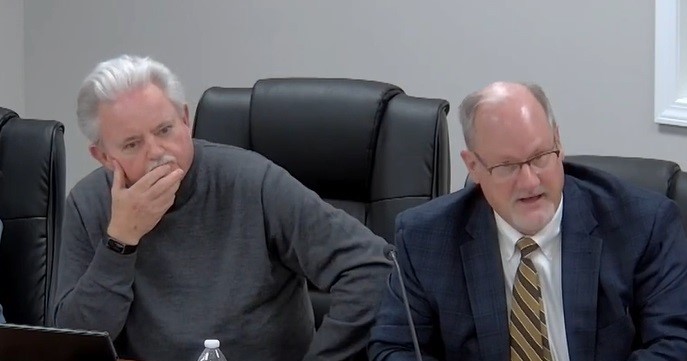Approved first reading of Ordinance 24-011 – compensation
By Barb Pert Templeton
People often complain about not getting regular pay raises but going 32 years without an increase may seem a bit extreme. Yet apparently that’s what the city commissioners and mayor in Marine City have endured.
At a Dec. 5 commission meeting City Attorney Robert Davis said a new and recent charter provision states that going forward the city will have an ordinance that governs the pay of the mayor and commissioners with the notation that the rate not go up more than 10% in any four-year period.
The original charter, which dates to 1951, had rates of $200 for commissioners and $300 for the mayor but they weren’t something the city has been utilizing. Instead, Mayor Pro Tem Lisa Hendrick said as far as she knows the current rates, $800 for commissioners and $1,200 for mayor have been in place for about 32 years.

The Marine City Commission meets on the first and third Thursdays of the month at 7 p.m.
“It’s been a long time, I’ve been coming to these since 1985 and my mom was on the board and that’s they way it’s been,” Hendrick said.
To meet the new charter requirements the commission itself must decide the new pay rates, Davis explained.
“We’re basically trying to do a reset now for the future,” Mayor Jennifer Vandenbossche said.
“This is a chance for you to bring this to equilibrium, you are long overdue on this,” Davis said. “And now you reset it and then the 10% governance takes place.”
City Manager Michael Reaves said he did some wage studies and checked with the Michigan Municipal League (MML) to see what the pay scales were in other communities and provided those numbers to the commission.
Reaves suggested officials look not in terms of holding the office but in who takes office after them. He suggested officials look at the office itself and decide what type of person they want to represent the board and what the value of their time might be.
He also suggested officials not look at the issue in terms of a flat meeting rate but look at what it takes for them to prepare for meetings and respond to citizen requests. The list would include phone calls, emails and the amount of paperwork involved in participating in the meetings.


Commissioner Sean O’Brien expressed concerns related to the commission applying one standard for themselves and something different for employees.
“What’s your expectation for the next person that takes office and what’s the value of their time?” Reaves said, noting that the commission has 24 meetings a year, two per month, and the mayor does double that with 48 meetings because she has agenda meetings.
“Woefully underpaid,” are the words Reaves used to describe the current rate of pay for officials.
“I commend you for your service to the community, but you’re the elected body of the citizens and I don’t think they expect you to go broke with your time,” Reaves said.
He provided the commission with parameters for pay scales and asked them to remember it hasn’t been reset in decades.
Commissioners offer their opinions
Commissioner Brian Ross said he had figures from the MML that state $2,000 for commissioners and $2,500 for mayor is the average rate of pay across the state.
“My family gets mad at me at the amount of time I spend digging through data, and emails and looking for grants and meeting with neighbors and community members but part of it is considered part of the job and part of it is that the present compensation is very, very minimal,” Ross said. “Clearly none of us are in this for the money however in my mind a large percentage of our population also keeps out of it because it’s just not worth the trouble.”
He pointed out the large jump in costs of late via inflation and said his ‘spit balling’ the issue would be to pay the mayor $4,000 and the commissioners $3,000.
Commissioner Sean O’Brien said three commissioners just ran unopposed so they have to make things more desirable so more people will run for office.
He said “the part of this that makes me incredibly upset and uncomfortable to engage in” is the fact that when the commission was talking about employee wages, they could not exceed eight percent and people were adamant about it but the proposed commission wages would far exceed that figure.
Mayor Pro Tem Lisa Hendrick said she didn’t think the two issues were comparable because on one hand they are talking about people making $70,000 versus the commissioners making $800.
“And you’re only asking to increase it to $2,000 and I know you’re doing the percentage thing but…,” Hendrick said.
Commissioner Rita Roehrig echoed that sentiment and said if you’re talking about eight percent that’s over 30 years because that’s how long it’s been since the commission got a raise.
O’Brien insisted that every thing brough up during considerations for wage increases for employees found the eight percent was a sticking point and now giving the commission more wouldn’t make things uniform across the board.
“We were talking about people getting eight percent when others were only getting two or three percent, that was the problem,” Hendrick said. “I don’t really care I’ve done this for 14 years and taken my $800 and it doesn’t make any difference to me at all.”
“All I’m asking for is that with this in mind as we go forward that we are fixing historic inaccuracies; we can’t just go oh the percentage is a number, that’s not how we do salary negotiations it is inappropriate for us as leaders of the community to apply one standard to ourselves and a different to our employees,” O’Brien said.
Commissioner Jacob Bryson said that if they wanted to go back and make the pay retroactive to 30 years the eight percent raise would be to $8,000 so making it a $3,000 for commissioners and $4,000 for the mayor seemed fair.
Roehrig said the city needs the increase for the future and while they don’t want people just doing it for the money having an incentive for people to serve wasn’t a bad thing.
Bryson made the motion for a first reading of the motion with the wages being $2,000 for the commissioners and $3,000 for the mayor, annually. Roehrig supported the motion.
The motion passed 5-2 with Commissioners Ross and O’Brien voting no.
During commissioner comments at the end of the meeting Commissioner William Klaassen had this to say about the issue.
“I guess I didn’t realize that commissioners got paid I thought it was volunteer when you get into this job,” he said.


